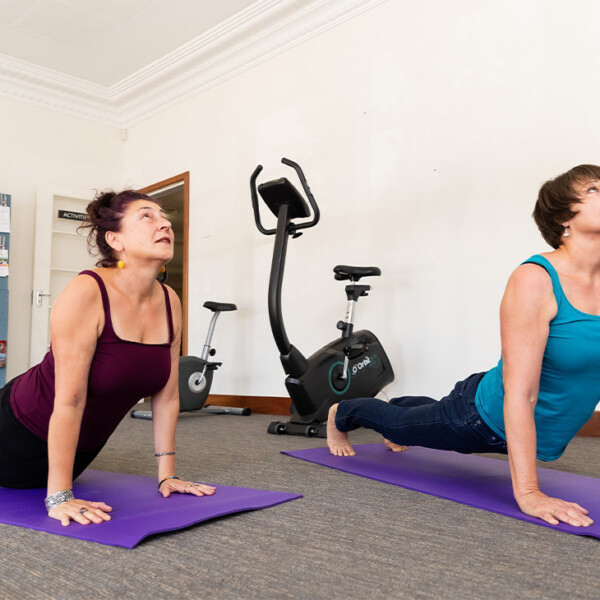Three key messages about physical activity after cancer:
- Exercise is an important part of cancer management as it can ease the severity of adverse side effects from treatment, reduce the risk of recurrence and improve quality of life.
- The sooner you start an exercise program, the greater the potential benefit.
- Your exercise program should include a variety of activity including aerobic, flexibility, stretching, strength training and resistance training.
Current research has shown that keeping physically active during and after cancer treatment can help reduce fatigue, improve cardiovascular fitness, and increase muscle strength, bone density, flexibility, balance, and coordination.
Regular participation in exercise and meditative programs can also lead to improvements in sleep quality, mood and wellbeing, and reductions in stress, anxiety, and depression.
Evidence-based studies have established a link between physical activity and cancer survival, including improving immune system function and suppressing cancer cell growth. Exercise can also help to reduce the risk of cancer recurrence and contribute to future cancer prevention.
Accredited Exercise Physiologists can develop personalized exercise programs for individuals after cancer treatment. You should let your treating medical team know you are going to exercise to determine if there are any precautions you should take. However, for most people, getting any physical activity in the day is better than none at all.
Cancer Council’s Exercise for People Living with Cancer booklet provides information about the benefits exercise may have during and after cancer treatments.
Cancer Council WA’s Life Now Program
Life Now facilitates individuals affected by cancer to experience the benefits of keeping mentally and physically active. Our Mindfulness, Mindful Art, Meditation, Tai Chi, Yoga and Exercise courses introduce healthy activities in a safe and supportive group environment. Our programs are designed to empower participants with valuable skills and techniques that can be used to help manage stress and other cancer-related symptoms.
For more information call our 13 11 20 Cancer Information and Support Line or visit our Life Now Program webpage.
What type of physical activity do I need to do to improve my health and fitness?
-
- Aerobic activity – this activity increases your breathing rate and heart rate for a sustained amount of time to improve your circulatory fitness.
- Flexibility and stretching – increases the range of movement around the joints and reduces muscle soreness and tension.
- Strength training and resistance training – improves muscle strength and increases your metabolism.
It is important to build up your exercise program slowly. You can start by walking a few times per week and include some stretching, then introduce strength building exercises. This can be discussed with your doctor, an exercise physiologist, or with a Wellbeing after Cancer health professional by submitting aa Request a Wellbeing after Cancer Callback form.
Ten mental health benefits of exercise
- Reduce stress
Working up a sweat can help manage physical and mental stress by increasing the concentration of norepinephrine in the brain – a chemical that can moderate the brain’s stress response. - Boost happy chemicals
Exercise releases endorphins, which create feelings of happiness and euphoria. Studies have shown that exercise can even alleviate symptoms of depression. - Improve self–confidence
Numerous studies show that physical fitness can boost self-esteem and improve positive self-image. - Tap into creativity
A heart-pumping workout session can boost creativity for up to two hours afterwards. - Increase productivity
Research shows that workers who take time for exercise on a regular basis are more productive and have more energy than their more sedentary peers. - Boost brain power
Various studies have shown that cardiovascular exercise can create new brain cells and improve overall brain performance. Studies also suggest that a tough workout increases levels of a brain-derived protein in the body, believed to help with decision making, higher thinking and learning. - Alleviate anxiety
Moderate-to-high intensity physical activity releases warm and fuzzy chemicals in the brain during and after your exercise session which can help to reduce anxiety. - Promote relaxation
Regular exercise promotes a good night sleep. Moving around five to six hours before bedtime raises the body’s core temperature. When the body temp drops back to normal a few hours later, it signals the body that it’s time to sleep. - Maximise memory
Working out increases the production of cells in the brain that are responsible for memory and learning. It has been shown that running sprints improved vocabulary retention among healthy adults. - Prevent cognitive decline
Working out, especially between age 25 and 45, boosts the chemicals in the brain that support and prevent degeneration of the hippocampus – an important part of the brain for memory and learning.
Useful links
- Life Now exercise, yoga and Tai Chi programs
- Be active everyday and sit less
- Home beginner workout
- LiveLighter Physical Activity Calculator
- Exercise for People Living with Cancer
- Breast Cancer Care WA
- Wellbeing after Cancer exercise tracker form
The expert content on this page has been informed by Steve Pratt who is an Accredited Exercise Physiologist and Accredited Practicing Dietitian who worked at Cancer Council WA for over 15 years. Over this time, he has seen the growing importance of exercise for cancer prevention and managing the side effects of cancer treatment.
